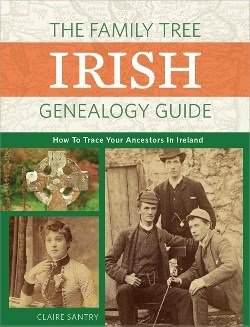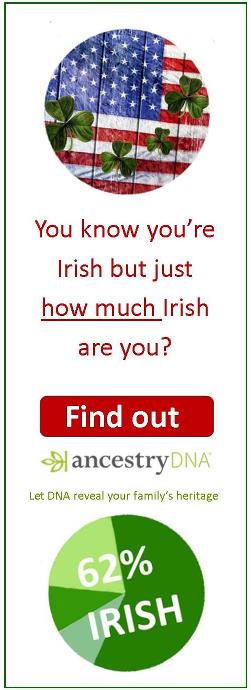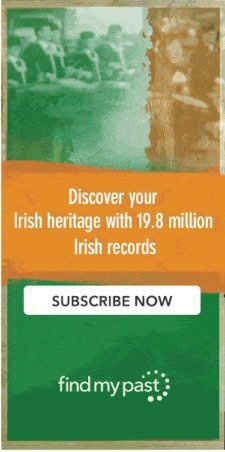- Home ›
- Townland of Origin
How to find your ancestor's townland of origin
Part 1: Overview
Knowing your ancestor's townland of origin in Ireland is the key to unlocking your Irish family history. If you already know this you can move on to the Next Steps in your research.
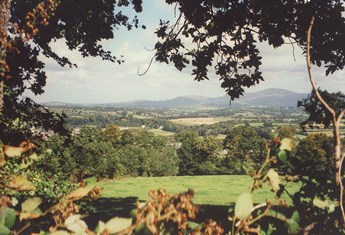 The place your ancestor once called home is out there somewhere
The place your ancestor once called home is out there somewhereFor those who don't know the exact location of the ancestral home – and they make up a sizeable proportion of the descendants of emigrants – this is the first and biggest stumbling block they encounter.
Many would-be family historians never even start their research because they don’t have this single, crucial clue to and don't know where to look for it.
The good news is that there are techniques and many sources to help you establish your ancestor's place of origin.
 The place your ancestor once called home is out there somewhere
The place your ancestor once called home is out there somewhereFor those who don't know the exact location of the ancestral home – and they make up a sizeable proportion of the descendants of emigrants – this is the first and biggest stumbling block they encounter. Many people who would love to know more about their family roots never even start their research because they don’t have this single, crucial clue to their Irish ancestry and they don't know where to look for it.
The good news is that there are techniques and many sources to help you establish your ancestor's place of origin.
What is a 'townland of origin'?
The island of Ireland is divided into provinces, counties, parishes and townlands (there are a few other divisions, but they're not relevant here).
Historically, townlands are the smallest measures of land. They vary in size from less than an acre to several thousand acres, but average 325 acres. In the Republic of Ireland they are still the predominant identifier of an address.
If you know your ancestral townland of origin, you should be able to learn much about your family and the community in which they lived.
Unfortunately, it isn't possible to know in advance which one source will reveal this vital detail! You may spread your net wide and not find it until you reach the last sources on your list, or you may find it in the first place you look.
The only certainty it that you need to keep the focus on pinpointing a precise location, or at the very least, the county where they lived.
If you already know the county but not the townland of origin, much of the advice below is still relevant but you should also follow the link to Part II at the bottom of this page.
Where to start?
The 32 counties
No matter what stage your research has reached, you'll find it helpful to know a little about each of the historical 32 counties of Ireland.
Learn about (in alphabetical order):
Where you
start your research will depend on what you already know about your Irish family history.
Before you go any further, answer a few questions.
- Have you fully exhausted the research stages and sources suggested on the Irish Roots and Next Steps pages?
- Have you interviewed older members of your family?
- Have you rummaged through old letters, newspaper clippings and mementos?
If not, get cracking.
There is no point going from one archive to another, nor spending your time and money flitting between global genealogy databases, when the information you seek is gathering dust in the attic or awaiting liberation from Grand Aunt Ellen's head!
The 32 counties
No matter what stage your research has reached, you'll find it helpful to know a little about each of the historical 32 counties of Ireland.
Learn about (in alphabetical order):
Search in your ancestor's adopted country
If your first steps have not identified a townland of origin in Ireland, you need to concentrate your efforts on the records of the country to which your ancestors emigrated (see link below).
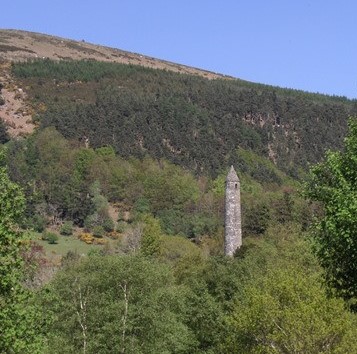 Celtic Round Tower in hills above Glendalough, Co Wicklow
Celtic Round Tower in hills above Glendalough, Co WicklowAll manner of information about your immigrant ancestors will have been recorded and you should not limit your research to just your direct line. You may find that one of your ancestor's relatives left behind a record of his or her exact place of residence in the old country, even if your direct ancestor did not.
Of course, if your many-times-great-grandfather left the ancestral home in the early 18th century, he could now have several hundred descendants scattered about. Don't be side tracked by maths!
It's perfectly possible that only one of his children was meticulous with their record keeping or passed on the detail of their Irish heritage.
 Celtic Round Tower in hills above Glendalough, Co Wicklow
Celtic Round Tower in hills above Glendalough, Co WicklowWhat is a 'townland of origin'?
The island of Ireland is divided into provinces, counties, parishes and townlands (there are a few other divisions, but they're not relevant here).
Historically, townlands are the smallest measures of land. They vary in size from less than an acre to several thousand acres, but average 325 acres. In the Republic of Ireland they are still the predominant identifier of an address.
If you know your ancestral townland of origin, you should be able to learn much about your family and the community in which they lived.
If you really want that detail - that location nugget that will allow you to unravel your Irish family history - you may have quite a search ahead.
The best places to look for that crucial piece of your Irish ancestry jigsaw are death certificates and headstone inscriptions, immigration records and census returns. Newspaper reports or local histories can also be very helpful.
Toolkit Top Tip
It is worth bearing in mind that when filling in official forms in his or her new country, your immigrant ancestor may have given the name of a civil parish, ecclesiastical parish, port or county of embarkation as his or her place of origin. For example, when asked 'where did you come from?' some immigrants may have replied 'Queenstown' or 'Dublin', even though their townland of origin, nearest town or county was a day or two's journey from where they caught their ship. Literal answers were especially likely from those with a limited command of English.
As far as I'm aware, this was not done intentionally to upset their genealogist descendants!
In addition, you can try the following sources, in any order that seems pertinent to your family:
- Civil registration: births, deaths and marriages
- Financial and tax records: held by banks, employers, insurers; accountant's notes; tax returns
- Death documentation: hospital admission details; coroner's report; death certificates; undertaker's records; gravestones
- Property and Land records: property deeds; repair or conservation grants
- Military records: draft cards, service records, pensions
- Immigration records: passenger lists; naturalisation declarations
- Newspapers: announcements of births, deaths, marriage, anniversaries; obituaries; news reports
- Occupational records: apprenticeships; professional qualifications; trade directories
- Probate and Administration: executor's comments; wills.
If your ancestors settled in Britain, I recommend you search FindMyPast UK. If your ancestors settled in the USA, Canada or Australia/NewZealand, you may find Ancestry and/or MyHeritage better. These are all subscription sites.
FamilySearch.org is the only major free database, and it happens to be the biggest, globally. It holds many of the above types of record collection; some are searchable from your own computer, while others only give full access via LDS FamilyHistoryCenters.
When to start looking at Irish records
Most genealogy books and websites tell you not to start looking at Irish family history records until you know your ancestor's townland of origin. To a large extent I'd agree. But I cannot categorically state that you'd be wasting your time.
Why? Because if I'd not known the county where my paternal ancestors had lived, I'd have found it very easily by looking at two major resources: the Irish civil registration index and Griffith's Valuation. These resources are now freely available online (links below)
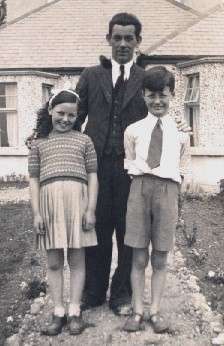 Posing with his two children outside their new home in Athlone, Co. Westmeath, in 1941 is my Grandad, Edmond Tierney. He was born in Ballymacadam, County Tipperary in 1903.
Posing with his two children outside their new home in Athlone, Co. Westmeath, in 1941 is my Grandad, Edmond Tierney. He was born in Ballymacadam, County Tipperary in 1903.If only for genealogical purposes, I'm lucky to have an unusual surname: Santry. By looking in Griffith's Valuation, I'd have found just 24 Santry householders recorded in Ireland in the early 1850s. Each one was in County Cork, and all but one was in West Cork. My hunt for a county of origin would have been over.
Similarly, if I had searched for my surname in the Irish Civil Registration collection, online or offline, it would have been quite clear not only that Cork was where I should be looking but that Clonakilty seemed to be the stronghold; at least 80% of the 377 Santry births recorded from 1864 to 1900 were registered in that town.
So, in just a few clicks I'd have been confident that my family came from South West Cork, and their townland of origin would probably have been fairly easy to discover.
Now comes a great big BUT.
If I'd been looking for my mother's family names – Tierney and Doyle – neither of these genealogical resources would have been any good to me. Sure, an index of Griffiths could have told me that the counties most associated ie numerically with these names are Tipperary and Wexford respectively (and from where, incidentally, both 'my' families happen to have originated), but there were hundreds of Tierney and Doyle households outside those two counties, too.
It would have been impossible to narrow down to my ancestors' county or townland of origin based on the thousands of names returned in one of these searches.
Since the majority of Irish family historians are much more likely to be chasing ancestors with common names such as Doyle, Murphy, Kelly, Sullivan and Ryan than rare surnames like Santry, Hosty, Lucid and Athy, these Irish sources are not going to be much practical use to most people at this very early stage of their research.
There's no harm taking a look anyway, even if only to satisfy your curiosity. If nothing else, they will give you an indication of the scale of your search for your Irish ancestry. Just don't be put off by the numbers!
Both searches are free: Civil Registration Indexes and Griffiths Valuation.
Where next?
- Back to the starting block?
- A strategic approach to locating your ancestor's townland of origin: see Part II
- You know your family's townland of origin? Time to move on with your Irish family history research.
- If you've narrowed down the area where your forbears lived and worked, check out these free Irish ancestry research sites for learning more about places.
- Find out more about Griffiths Valuation and other land and property records.
- Understand the administrative reasons for Irish land divisions.
Where next?
~ Back to the starting block?
~ A strategic approach to locating your ancestor's townland of origin: see Part II
~ You know your family's townland of origin? Time to move on with your Irish family history research.
~ If you've narrowed down the area where your forbears lived and worked, check out these free Irish ancestry research sites for learning more about places.
~ Find out more about Griffiths Valuation and other land and property records.
~ Understand the administrative reasons for Irish land divisions.
